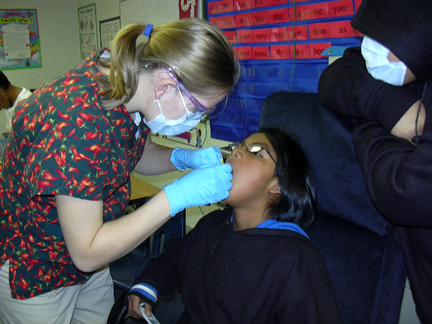
Northern Arizona University is surrounded by some of the most medically needy areas in the state, especially in the nearby Native American communities.
But students, faculty and staff in the university’s College of Health and Human Services are building programs that address the critical needs of the American Indian population while graduating students who have received hands-on public health experience.
“It is clear that significant disparities exist regarding the care of American Indian populations,” said Leslie Schulz, executive dean of the College of Health and Human Services. “I think our students, faculty and staff have a tremendous opportunity to begin addressing some of those disparities.”
According to the Arizona Department of Health Services, Flagstaff is part of or adjacent to five federal medically underserved areas. A large part of the medically underserved population is comprised of Native Americans residing on nearby reservations.
During the past decade, the college has developed a number of different programs designed to create what Associate Dean Denise Helm calls “win-win situations” for serving Native American populations.
One of these programs is the Hopi Health Center Partnership, a grant-funded initiative that provides about 30 junior and senior dental hygiene students the opportunity each semester to provide care on the Hopi Reservation. For students, participating in this program means hands-on public health work and a chance to help people with tremendous medical needs.
“This truly is a win-win situation because students who are exposed to experiences in public health typically go into public health,” Helm said. “This program also allows Indian Health Services to meet the demand for dental services without having to hire additional people.”
Maxine Janis, an assistant clinical professor in the Dental Hygiene program and the coordinator of the Hopi Health Center Partnership, said the goal of programs like the one she oversees is to create a sustainable way to meet health care demand among Native populations. “The aim is to provide education for Native American students in the various health care disciplines and to create a pipeline for American Indian health care professionals to return to their communities to work and live,” she said.
NAU also offers the American Indian Bachelor of Science in Nursing Program, which allows residents of the Navajo, Hopi or other American Indian nations to complete course requirements while working in local clinics. Student Megan Ross, who is one of the few non-Native Americans enrolled in the program, is passionate about the opportunity to serve members of the Navajo Nation.
“There is a real need for nurses who live in the community and who are committed to the community,” she said. “A lot of traveling nurses come and go, so there is no continuity.”
The commitment to serving medically needy populations also is woven into the curriculum of many courses. For instance, seniors in assistant clinical professor Regina Eddie’s public health nursing classes conduct on-site community needs assessments each semester. Students travel to local reservations to help communities develop ways to cope with public health issues, Eddie explained.
“I had a group last semester that was trying to find ways to address childhood obesity in a situation where there were few resources to do anything,” she says. “So they worked on developing a teaching plan for teachers to talk about healthier nutrition choices that children could make. Our focus, too, is on making sure that the project is sustainable for the community.”



